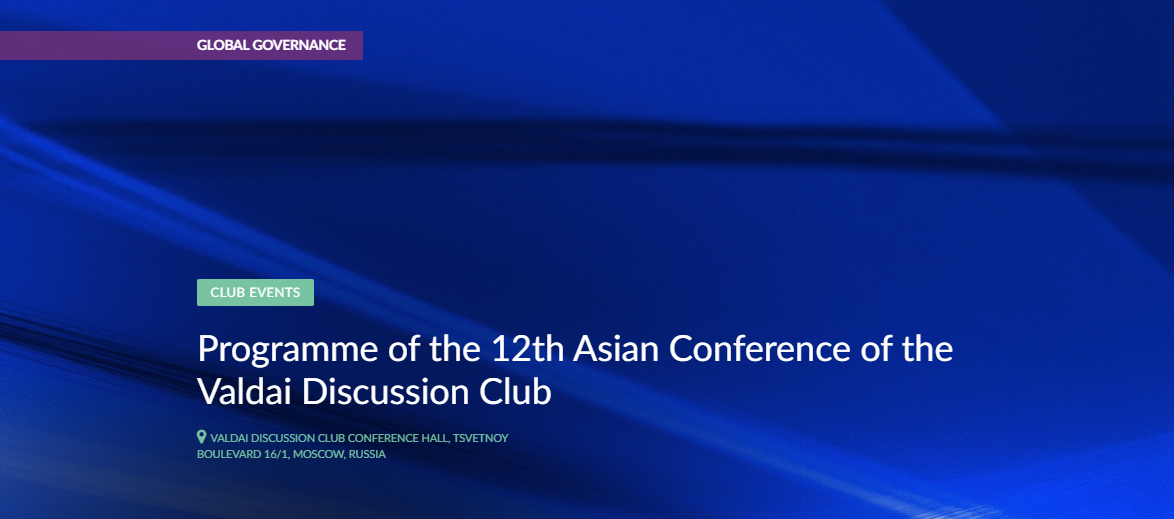EVENTS
Your Present Location: EVENTS【2021-12-7】The 12th Asian Conference of the Valdai Discussion Club

Programme of the 12th Asian Conference of the Valdai Discussion Club
“Russia and Asia in a Changing World Order”
Moscow, December 7 - 8, 2021
December 7, Tuesday
11:30-12:00 Opening of the conference (live broadcast):
-
Andrey Bystritskiy, Chairman of the Board of the Foundation for Development and Support of the Valdai Discussion Club;
-
Alexey Ovchinnikov, Director, Asian and Pacific Cooperation Department, Ministry of Foreign Affairs of the Russian Federation.
12:00-13:30 Session 1. The Pandemic: Development and International Politics in Asia (live broadcast)
The global coronavirus pandemic has changed the international political and economic landscape in Asia and influenced the behaviour of states. Each of them had to choose their own unique recipe for protecting the population from disease and adapting the economic system to its consequences. Some countries have taken the path of transport and economic closure. Others remained more open to the world, but also inevitably faced the consequences of universal comparative autarchy. Objective of the session: to highlight and discuss the main consequences of the pandemic for the Asian region, both in general and at the level of individual states
Speakers:
-
Sungbae An, Director, International Macroeconomics and Finance Department, Korea Institute for International Economic Policy (online);
-
Wang Wen, Professor, Executive Dean Chongyang Institute for Financial Studies, Renmin University of China (online);
-
Dino Patti Djalal, Founder and President, Foreign Policy Community of Indonesia;
-
Igor Makarov, Head of the School of World Economy and Laboratory for Economics of Climate Change, National Research University Higher School of Economics.
Moderator:
-
Tsogtbaatar Damdin, Member of the Parliament of Mongolia; Head of Mongolian Delegation, OSCE Parliamentary Assembly.
14:30-16:00 Session 2. Asia-Pacific or Indo-Pacific: Multilateral Cooperation in Asia in the Light of New Initiatives and Alliances?
The global shift in the balance of power is leading to significant stress on institutions that emerged during the Cold War and after its end. Multilateral cooperation in Asia has always served the economic development of the countries of the region and smoothing out contradictions between them. The epitome of this approach is ASEAN, which is now experiencing double pressure amid the US-China confrontation. New associations are becoming not tools of cooperation, but means of competition in the struggle for markets and political influence. What does the new era bring to the traditional Asian model of cooperation? Will the old institutions be preserved and will the new ones survive? How will Asia cope with the arrival of India in the Pacific and the competition between the United States and China?
Speakers:
-
Thomas Daniel, Senior Fellow, Foreign Policy and Security Studies, Institute of Strategic and International Studies (ISIS) Malaysia (online);
-
Nelson Wong, Vice Chairman, Shanghai Centre for RimPac Strategic and International Studies (online);
-
Alexei Kupriyanov, Head of the Group on South Asia and Indian Ocean of the Center for Asia Pacific Studies, Institute of World Economy and International Relations of the Russian Academy of Sciences (IMEMO);
-
Viktor Sumsky, Leading Expert, ASEAN Center,MGIMO University.
Moderator:
- Lily Ong, TV Journalist.
16:15-17:45 Session 3. What Can Asia and Russia Give Each Other? (live broadcast)
Over the past twelve years, Russia's policy in Asia has been developing in the paradigm of integration with the regional market and increasing the level of political presence. However, the turn to the East has now slowed down even as economic relations with China are on the rise. The problem for Russia is determining its own contribution to Asian stability and development. The problem for Asian countries is the uncertainty of what can be expected from Russia and what its contribution could be. Has Russia reached the limits of its turn towards Asia? What can Russia offer regional partners in the new conditions and what can they offer it?
Speakers:
-
Victoria Panova, Vice-President for International Relations at the Far Eastern Federal University;
-
Le Trung Kien, Assistant Director General, Director of the Center for Development and Security Studies, Diplomatic Academy of Vietnam (online);
-
Feng Shaolei, Director of the Centre for Russian Studies; Director of the Centre for Co-development with Neighbouring Countries, East China Normal University (online);
-
Taisuke Abiru, Senior Research Fellow, Sasakawa Peace Foundation (online);
Moderator:
- Yana Leksyutina, Professor, School of International Relations, Saint-Petersburg State University.
December 8, Wednesday
10:30-12:00 Session 4. Status and Potential of Regional Conflicts
Despite the fact that the Asian region is not, unlike Europe, an arena for confrontation between powerful military players, it has local conflict zones. First of all, these are Afghanistan and the Korean Peninsula. Over the past two years, a number of developments have taken place here. Their geopolitical significance is hard to underestimate, since they have not only local but also long-term international effects. How are the countries of the region reacting to the ongoing transformations? Are their national strategies changing in this regard?
Speakers:
-
Zhou Bo, Senior Fellow, Centre for International Security and Strategy, Tsinghua University; Expert, China Forum (online);
-
Andrei Lankov, Professor, Kookmin University; Director NK News (online);
-
Vasily Kashin, Director, Center for Comprehensive European and International Studies, National Research University Higher School of Economics;
-
Muhammad Athar Javed, Director General, Pakistan House.
Moderator:
- Fyodor Lukyanov, Research Director of the Valdai Discussion Club.
Key Words: China; US; Valdai; RDCY























































































 京公网安备 11010802037854号
京公网安备 11010802037854号





